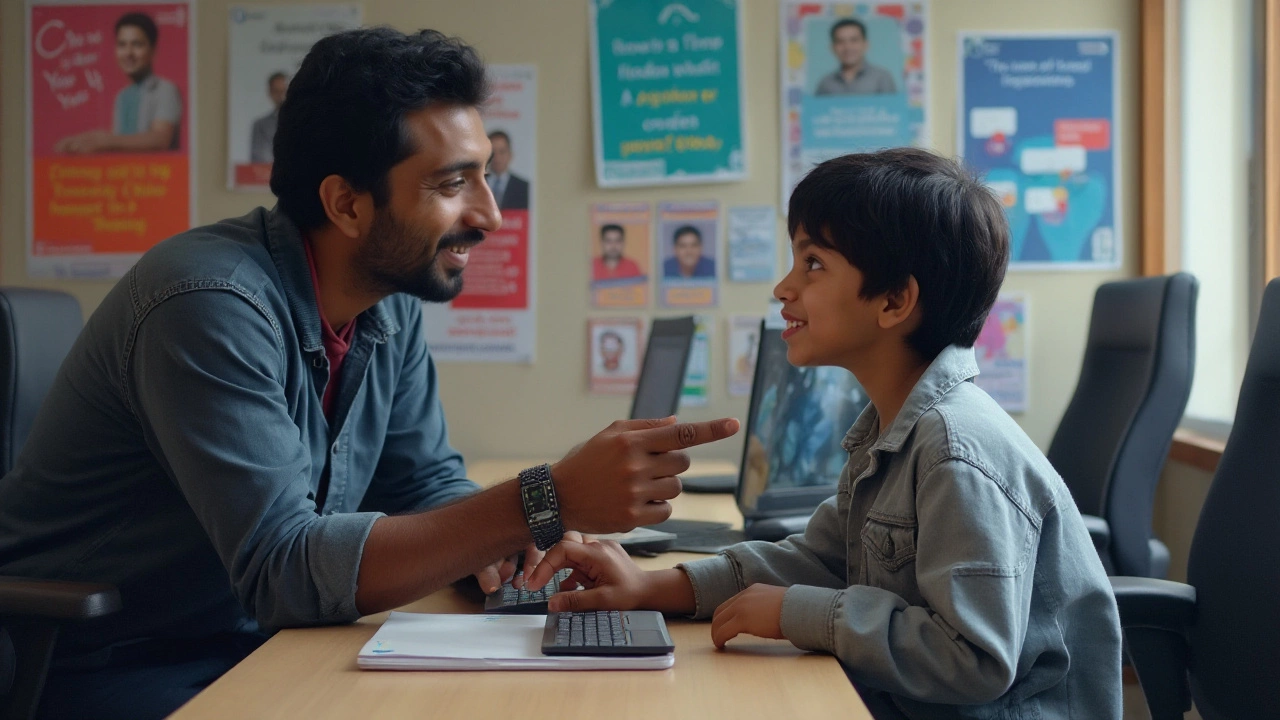Coding has garnered a reputation for being one of the most demanding fields out there. But what is it that makes programming seem so challenging? Is it the endless sea of languages and frameworks, or is it the pressure of constantly adapting to the latest technologies? For many, the apprehension stems from the fear of the unknown and a misunderstanding of what coding truly entails.
Despite the complexities, coding is a craft that can be mastered with patience and dedication. The journey might be filled with hurdles, but it's also an adventure that promises immense satisfaction when you solve that tough bug or ship your first application. Every coder's path is unique, and while some find certain aspects demanding, others revel in the logical challenges presented by debugging and algorithm optimizations.
The Intricacies of Coding
Coding is a world of languages and logic, an exciting labyrinth waiting to be explored. One of the initial challenges lies in choosing from the plethora of programming languages available. Each language boasts its unique syntax and idiosyncrasies, which can be overwhelming for someone just stepping into the field. Languages like Python are hailed for their simplicity and readability, making them a popular choice for beginners. In contrast, languages such as C++ offer more complexity with their rich features and depth, which can be daunting yet ultimately rewarding for seasoned developers.
The role of a programmer isn't just about writing code. Understanding algorithms and data structures is crucial, as they are the backbone of efficient program design. An algorithm is a step-by-step procedure required to perform a task, while data structures are ways to store and organize data. Mastering these concepts not only enhances one's ability to solve complex problems but also instills a deeper appreciation for the subtleties of coding. Many often reference Donald Knuth's works, a renowned figure in this domain, to grasp the beauty and elegance hidden within algorithm designs. As he puts it, "The real problem is that programmers have spent far too much time worrying about efficiency in the wrong places and at the wrong times; premature optimization is the root of all evil."
A major part of coding involves debugging and problem-solving. Few experiences beat the satisfaction of fixing a tricky bug that had you stumped for hours, if not days. Debugging sharpens your analytical skills and teaches you perseverance and patience — qualities vital for any thriving coder. The process might occasionally feel like searching for a needle in a haystack, but each solution adds to your growing repository of knowledge, helping you tackle future coding challenges more adeptly.
Not to be overlooked, coding also involves maintaining and improving existing code. The software world evolves at a dazzling pace, and with it, so do programming standards and demands. Keeping up-to-date with the latest developments and best practices is part of the job. Programmers often engage in code reviews, an effective way to ensure code quality and learn from peers. These sessions allow programmers to discuss different approaches and solutions, fostering a collaborative environment where everyone's coding prowess can flourish.
Let's consider data from the Stack Overflow Developer Survey, a trusted resource that annually provides insights into the coding realm. According to their 2023 report, about 65% of developers described themselves as self-taught, highlighting the accessibility and adaptability of coding education today. This trend proves that anyone with dedication and the right resources can venture into coding and excel. It's an open field where independent learning is highly valued and often leads to innovative breakthroughs.
The path of coding is rich with complexities and continuous learning. Embracing these intricacies is essential for anyone aspiring to thrive in a coding job. The blend of art and science in coding creates a captivating career filled with endless possibilities. With the right mindset and tools, navigating this promising landscape becomes an achievable triumph for all who dare to embark on the journey.

Overcoming Challenges
When embarking on a journey in coding, it's only natural to face a fair share of challenges. Whether you're a novice or someone who has been in the field for years, obstacles are bound to appear. These hurdles, however, are not without solutions. Many times, the key lies in understanding the problem deeply and breaking it down into manageable tasks. New programmers often grapple with grasping complex concepts quickly, but patience and persistence go a long way. By segmenting large problems into smaller, more digestible parts, tackling difficulties becomes a much easier task. This approach not only makes the challenge less daunting but also builds confidence and empowers you to tackle even bigger issues with time.
That said, dealing with coding frustrations requires more than just technical solutions. Community support can be invaluable in overcoming tricky problems. Coding communities, both online and offline, are filled with individuals who have likely faced similar issues, and their insights can shed light on alternative solutions. Engaging with these groups can provide comfort in knowing you’re not alone and can offer practical advice or moral support. Still, it's essential to keep in mind that while learning from others is beneficial, one should also develop the ability to troubleshoot independently, as this is a critical skill in any coding job.
Moreover, it's crucial to stay adaptable and flexible. The field of technology evolves swiftly, and what you learn today may need to be modified tomorrow. According to a report from Stack Overflow, nearly 75% of developers reported learning a new technology at least once a year. This statistic underscores the importance of lifelong learning in the field of technology. Keeping your skills up-to-date not only increases your competency but also keeps you motivated. Embrace these changes as opportunities rather than obstacles, and seek out resources such as online courses, webinars, and workshops to enrich your learning experience.
Another effective strategy is to build a solid foundation of fundamental concepts before diving into more advanced topics. This foundational knowledge acts as a scaffolding on which you can layer more complex ideas comfortably. In her book "Lean In," Sheryl Sandberg mentions, "Careers are a jungle gym, not a ladder." This insight holds true in coding as well. The path may be non-linear, but each skill you master connects and supports the others, allowing you to ascend in various directions. High-level programming often relies on a nuanced understanding of basic principles, so don't skip the basics!
Lastly, it's important to celebrate small victories along the way. Coding can sometimes feel like an endless cycle of challenges, but marking your progress with achievements, no matter how minor, can maintain your motivation and outlook. Building a programming classes project from scratch, fixing a longstanding bug, or learning a new programming language are all accomplishments deserving recognition. By commemorating these moments, you gain a sense of fulfillment and encourage a positive attitude toward future challenges. Remember, every piece of code you write, every class you attend, and every problem you solve contributes to your growth as a coder.

Tips for Beginners
Embarking on a journey into the world of coding can be an exhilarating yet intimidating experience. For newcomers, understanding where to start can often be as challenging as mastering the operations themselves. One of the first steps is to choose a programming language that aligns with your aspirations. Languages like Python are revered for their ease of use and flexibility, making them ideal choices for beginners aiming to build a solid foundation without feeling overwhelmed.
Practice is paramount when learning to code. Allocate a portion of your day to writing code, familiarizing yourself with different environments, and working on small projects. This approach not only cements your understanding but also instills confidence to tackle more complex problems. As the famous programmer Robert C. Martin once said,
"The only way to go fast, is to go well."Developing your skills through consistent practice ensures you'll write efficient and effective code in the long run.
Community and mentorship play a significant role in the journey of every aspiring programmer. Joining forums, attending meetups, or contributing to open-source projects can provide you with real-world exposure and invaluable feedback. Engaging with more experienced programmers can accelerate your learning curve and open doors to new opportunities. The tech community is vast, with platforms like GitHub serving as a valuable resource for collaboration and growth.
Understanding the importance of problem-solving in programming is essential. Coding is much more than just syntax and semantics; it's about solving problems in innovative ways. Consider tackling coding challenges and competitions on platforms like LeetCode or HackerRank. These challenges not only sharpen your skills but also prepare you for technical interviews, a crucial part of securing a position in the IT career field.
Balancing theory and practice is another critical aspect. While it's tempting to dive right into coding, having a good grasp of fundamental computer science concepts can enhance your understanding of why certain solutions work. Concepts such as data structures, algorithms, and design patterns are the backbone of efficient coding. Consider online courses or textbooks to build this knowledge alongside your practical exercises.
In an industry driven by innovation, adaptability remains a key skill. Technologies and frameworks evolve rapidly, and keeping abreast of trends is necessary for staying relevant and competitive. Subscription to tech blogs, attending webinars, and engaging in online courses can help in this regard. Constant learning is central to thriving in the ever-evolving landscape of IT career paths.

Skills for Success
Whether you're standing at the threshold of a coding job or you're already knee-deep in the challenging waters of software development, acquiring the right skills is crucial for success. While technical skills are obviously important, they are not the only factors that determine your career's trajectory. Coding is inherently a creative process. It requires not just an understanding of how something works, but the ability to think outside the conventional boxes and meet challenges head-on. An essential skill is problem-solving ability. Programming is writing instructions to solve problems, and often the problems you'll face aren't straightforward. You might need to break down complex challenges into smaller, more manageable tasks, and tackle them one by one.
Another critical skill is the capacity to adapt. As technology advances, the tools and languages that developers use continue to evolve. Adaptation isn't just about knowing the latest programming classes but being eager to learn. Keeping up with industry developments and being open to new ways of doing things are traits shared by nearly all successful programmers. Equally important is strong communication skills. Coders don’t work in a vacuum — they must collaborate with others. This might mean communicating with clients who may not have a technical background, or working within a team where everyone needs to be on the same page. These interactions require clarity and patience.
A quote from Steve Jobs comes to mind:
“Everybody in this country should learn to program a computer, because it teaches you how to think.”This underscores the cognitive skills developed through coding that extend beyond any specific project. While technical prowess might get you through the door, it's these cognitive and interpersonal skills that help solidify your position and ensure longevity in the field. There's also a compelling argument for resilience. In coding, not every solution works on the first try — or even the second or third. Debugging can be frustrating, and it often feels like you're taking two steps forward and one step back. A successful coder embraces failure as part of the journey, learning from missteps and applying that knowledge moving forward.
While technical skills are often quantifiable, soft skills generally aren't. Yet, they form the bedrock of every successful programmer's skillset. Understanding the balance between these skills is vital. Technical skills can include mastering languages such as Python, Java, or C++, understanding databases, and having a grasp of algorithms and complexity analyses. But without perseverance, communication, adaptation, resourcefulness, and creative problem-solving, even the best technical skills can only take you so far in an IT career. Remember, it's a blend of these skills that pave the way for genuine success in the world of coding.
